"Caesar and Me" is episode 148 of the American television anthology series The Twilight Zone starring Jackie Cooper as a ventriloquist. It is not to be confused with a similar episode "The Dummy", starring Cliff Robertson as a ventriloquist.

The Murder at the Vicarage is a work of detective fiction by British writer Agatha Christie, first published in the UK by the Collins Crime Club in October 1930 and in the US by Dodd, Mead and Company later in the same year. The UK edition retailed at seven shillings and sixpence and the US edition at $2.00.

Parker Pyne Investigates is a short story collection written by Agatha Christie and first published in the UK by William Collins and Sons in November 1934. Along with The Listerdale Mystery, this collection did not appear under the usual imprint of the Collins Crime Club but instead appeared as part of the Collins Mystery series. It appeared in the US later in the same year published by Dodd, Mead and Company under the title Mr. Parker Pyne, Detective. The UK edition retailed at seven shillings and sixpence (7/6) and the US edition at $2.00.

Mystery Street is a 1950 American black-and-white film noir featuring Ricardo Montalbán, Sally Forrest, Bruce Bennett, Elsa Lanchester, and Marshall Thompson. Produced by MGM, it was directed by John Sturges with cinematography by John Alton.

Quick Service is a novel by P. G. Wodehouse, first published in the United Kingdom on 4 October 1940 by Herbert Jenkins, London and in the United States on 27 December 1940 by Doubleday, Doran, New York.
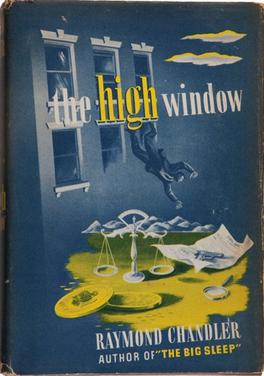
The High Window is a 1942 novel written by Raymond Chandler. It is his third novel featuring the Los Angeles private detective Philip Marlowe.

Gideon's Day is a 1958 police procedural crime film directed by John Ford and starring Jack Hawkins, Dianne Foster and Cyril Cusack. The screenplay was by T.E.B. Clarke, adapted from John Creasey's 1955 novel of the same title.

Sofia Ivanovna Blyuvshtein, was a female con artist who lived in the Russian Empire and was eventually convicted of theft. She committed several carefully planned robberies, and was eventually captured and exiled to the Sakhalin penal colony. She became the basis of several books and films, in which she is romanticized as a Robin Hood figure, who never killed, and who stole only from the rich.
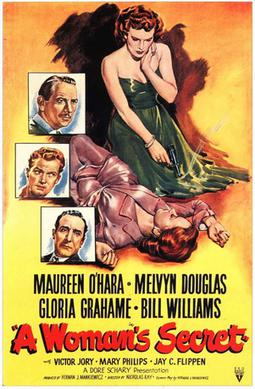
A Woman's Secret is a 1949 American film noir/mystery starring Maureen O'Hara, Gloria Grahame and Melvyn Douglas. Directed by Nicholas Ray, it was written and produced by Herman J. Mankiewicz based on the novel Mortgage on Life by Vicki Baum.

Too Many Husbands is a 1940 American romantic comedy film about a woman who loses her husband in a boating accident and remarries, only to have her first spouse reappear—yet another variation on the 1864 poem Enoch Arden by Alfred, Lord Tennyson. The film stars Jean Arthur, Fred MacMurray and Melvyn Douglas, and is based on the 1919 play Home and Beauty by W. Somerset Maugham, which was retitled Too Many Husbands when it came to New York. The film was directed by Wesley Ruggles.
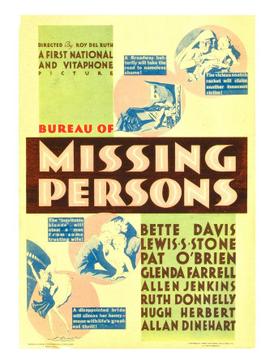
Bureau of Missing Persons is a 1933 American pre-Code drama film with comic overtones directed by Roy Del Ruth and starring Bette Davis, Lewis Stone, Pat O'Brien and Glenda Farrell. The screenplay by Robert Presnell is based on the book Missing Men by former New York City Police Captain John H. Ayers and Carol Bird.

There's Always a Woman is a 1938 American comedy mystery film directed by Alexander Hall and starring Joan Blondell and Melvyn Douglas. Seeing the potential for a series, Columbia Pictures quickly made a sequel, There's That Woman Again, released the same year, with Douglas reprising his role, but with Virginia Bruce as Sally. No further sequels were made.

Blame It on the Bellboy is a 1992 comedy film written and directed by Mark Herman and starring Dudley Moore, Bryan Brown, Patsy Kensit, Richard Griffiths, and Bronson Pinchot. The plot is about a case of mistaken identity of three individuals with similar-sounding surnames staying at the same hotel.

Ordinary Miracles is a 2005 American made-for-television drama film directed by Michael Switzer, written by Bud Schaetzle, and starring Jaclyn Smith, Lyndsy Fonseca, and C. Thomas Howell.
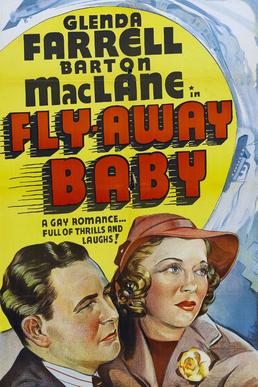
Fly-Away Baby is a 1937 American crime-mystery film starring Glenda Farrell as reporter Torchy Blane, along with her detective boyfriend, Steve McBride solving a murder and smuggling case during around-the-world flight.

Mr. Holmes is a 2015 mystery film directed by Bill Condon, based on Mitch Cullin's 2005 novel A Slight Trick of the Mind, and featuring the character Sherlock Holmes. The film stars Ian McKellen as Sherlock Holmes, Laura Linney as his housekeeper Mrs. Munro and Milo Parker as her son Roger. Set primarily during his retirement in Sussex, the film follows a 93-year-old Holmes who struggles to recall the details of his final case because his mind is slowly deteriorating.
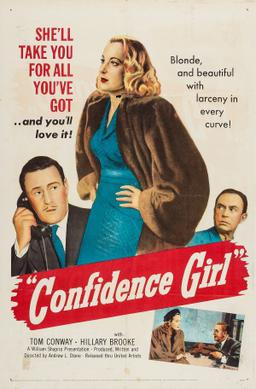
Confidence Girl is a 1952 American crime film written and directed by Andrew L. Stone. The film stars Tom Conway, Hillary Brooke, Eddie Marr, John Gallaudet, Jack Kruschen, Dan Riss and Walter Kingsford. It was released on June 20, 1952 by United Artists.

Flying Too High is a crime novel by Australian author Kerry Greenwood, and was published in 1990 by Penguin Books. It is the second novel by Kerry Greenwood that features the fictional detective Miss Phryne Fisher.
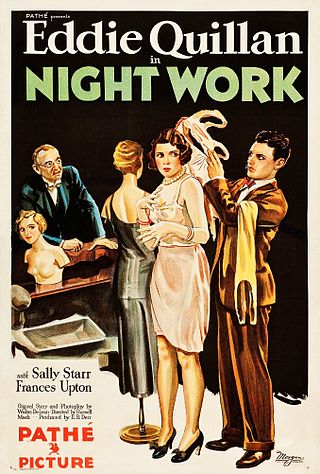
Night Work is a 1930 American pre-Code comedy film starring Eddie Quillan, Sally Star, and Frances Upton. The film was directed by Russell Mack.

















